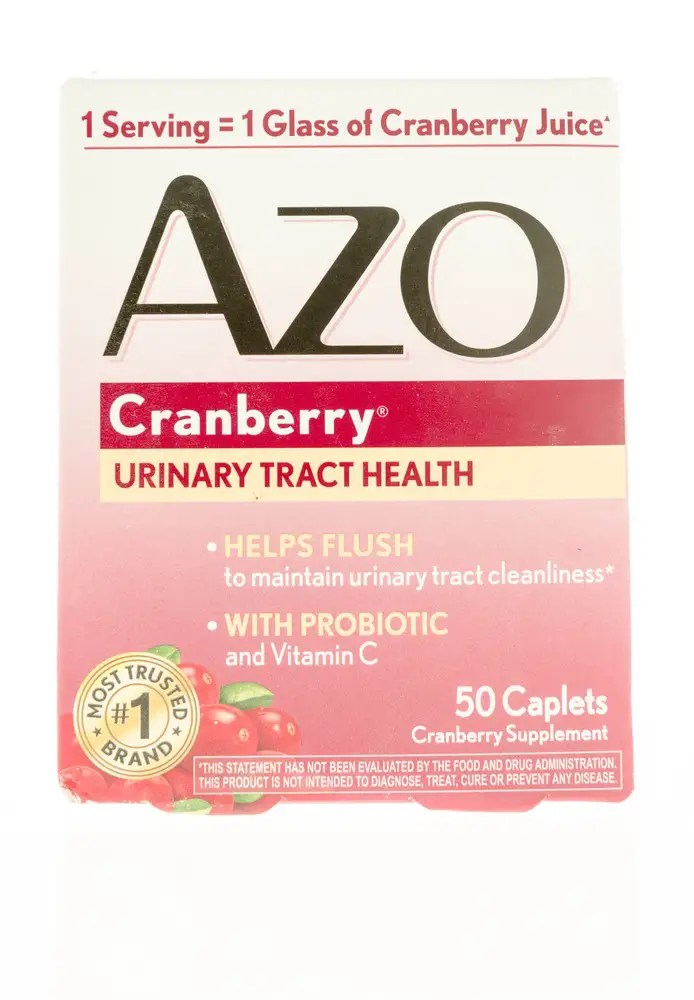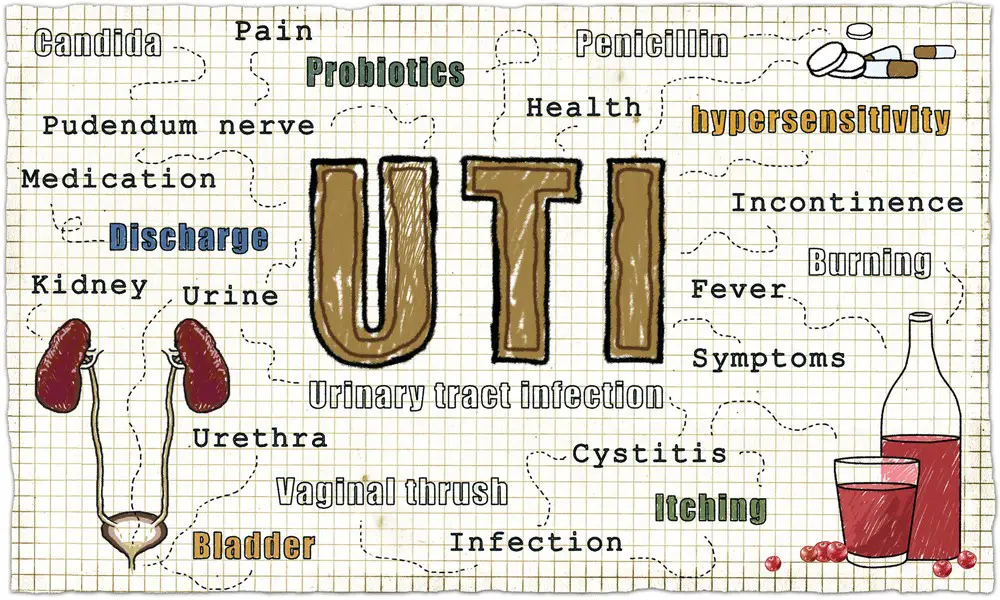As a BetterHelp affiliate, we receive compensation from BetterHelp if you purchase products or services through the links provided
Dealing with a urinary tract infection (UTI) can be challenging, and finding a comfortable sleep position becomes even more difficult. The pain and urgency to urinate frequently disrupt sleep patterns and lead to sleepless nights. To find relief and get some much-needed rest, certain strategies can help alleviate the discomfort.
To begin with, placing a heating pad on the lower abdomen can provide soothing warmth that helps to ease the pain associated with UTIs. It’s equally important to stay well-hydrated by drinking adequate water throughout the day, which can also help flush out bacteria and promote better sleep. Additionally, avoiding caffeine and alcohol during this time can improve sleep quality, as both substances irritate the bladder.
Combining pain relief medication with these strategies can also help to reduce UTI discomfort while sleeping. Over-the-counter pain relievers, such as ibuprofen or acetaminophen, can help manage pain levels and decrease inflammation, increasing the chances of a more restful sleep experience. Consulting with a healthcare professional for proper treatment and recommendations is always advisable, ensuring effective recovery and a good night’s sleep.
Causes and Symptoms of UTI Discomfort
Causes of UTI
Urinary tract infections (UTIs) are primarily caused by bacteria, with Escherichia coli (E. coli) being the most common culprit. These bacteria enter the urinary tract, leading to infection and inflammation. Other factors can increase the risk of developing UTIs, such as diabetes, which weakens the immune system and makes it more susceptible to infections.
Common Symptoms
People with UTIs typically experience various symptoms, which can cause discomfort during sleep. Some of the most common signs include:
- Frequent urination: The need to urinate more often than usual, sometimes with little urine output.
- Burning sensation: A painful burning sensation during urination or the persistent feeling of needing to urinate.
- Pelvic pain: Discomfort or pressure in the lower abdomen or pelvic area, particularly in women.
- Cloudy urine: The infected urine may appear cloudy or have a strong, unpleasant odor.
- Fever: A mild fever may also indicate the body’s attempt to fight off the infection.
Recognizing these symptoms and seeking medical attention is essential, as untreated UTIs can lead to more severe complications, such as kidney or bladder infections.
Nighttime Strategies for Managing UTI Discomfort

Fluid Intake and Bathroom Breaks
Being smart about fluid intake is crucial when managing UTI discomfort at night. Drinking water throughout the day can help flush out the bladder and reduce irritation, but it’s important to decrease fluid consumption before bedtime. This will minimize the need for nighttime bathroom breaks and improve sleep quality.
In contrast, certain drinks should be avoided as they can irritate the urinary tract, such as alcohol, soft drinks, and anything containing caffeine. Opt for beverages like herbal tea, which can soothe the body and promote relaxation.
Sleeping Positions and Pillow Support
Experimenting with sleeping positions can help alleviate UTI pain at night. Some individuals may find relief by lying on their side with a pillow between their knees to relieve pressure on the bladder while aligning the spine. In addition, using extra pillows to elevate the upper body can also ease discomfort by reducing the force of gravity on the urinary tract.
Incontinence Pads and Products
For those who experience nighttime incontinence during a UTI, using incontinence pads and products can provide an added layer of protection and comfort. They can absorb any unintentional leakage, preventing further irritation from moisture and allowing for a more restful night’s sleep.
Over-the-counter pain relievers, such as phenazopyridine, can provide temporary relief in cases of persistent pain and urgency. However, consulting with a healthcare professional before self-medicating is essential, as analgesics should only be used briefly.
Home remedies to alleviate further UTI discomfort, such as taking a warm sitz bath before bed or maintaining good hygiene by showering regularly, can contribute to a more comfortable sleeping experience.
Lastly, since sexual activity can contribute to UTIs, particularly among women, it is essential to note that it should be avoided during active infection and until symptoms subside to prevent further irritation and potential complications.
Incorporating these nighttime strategies into one’s routine can minimize UTI discomfort and promote better sleep quality during healing.
Cranberry Juice

Cranberry juice is often recommended for those experiencing discomfort with urinary tract infections (UTIs). Its benefits are thought to stem from certain compounds found in cranberries. These compounds, known as proanthocyanidins, are believed to help prevent UTI-causing bacteria from sticking to the walls of the urinary tract.
Drinking cranberry juice during a UTI may relieve discomfort, but consuming pure, unsweetened juice is essential. Sugar can exacerbate UTI symptoms, so avoiding added sugars is best. Always check the label and choose a product without added sugar or artificial sweeteners to ensure you drink pure juice.
Another way to enjoy the benefits of cranberry juice is to consume it in the form of unsweetened cranberry concentrate. This concentrate can be added to water, tea, or smoothies. The recommended daily intake for cranberry concentrate is around 1-2 tablespoons mixed with your chosen liquid.
| Type | Cranberry Intake Recommendations |
|---|---|
| Pure, unsweetened cranberry juice | 8 oz |
| Unsweetened cranberry concentrate | 1-2 tablespoons |
It is important to note that cranberry juice is not a substitute for proper medical treatment. If you suspect you have a UTI, consult with a healthcare professional who can prescribe the necessary antibiotics. Cranberry juice should be used with medical treatment to help manage the discomfort associated with a UTI.
In addition to cranberry juice, staying hydrated is crucial for preventing and easing UTI discomfort. Drinking plenty of water can help flush out bacteria in the urinary system and minimize irritation. Aim for at least eight 8-ounce glasses of water daily to keep your body well-hydrated and support healing.
Pain Relief and Home Remedies
When dealing with UTI discomfort, there are various pain relief options and home remedies to consider. This section covers some of the most effective methods for alleviating pain and ensuring a more comfortable night’s sleep.
Over-the-Counter Pain Relievers
Over-the-counter pain relievers such as ibuprofen and acetaminophen can help manage UTI pain. These medications can reduce inflammation, bladder spasms, and overall discomfort. However, remember to follow the instructions on the label and consult your healthcare provider before using any medication.
Heat Therapy
Applying heat can also offer relief from UTI pain. A hot water bottle or heating pad can warm the lower abdomen area. This method helps relax muscles and alleviate bladder spasms. When using heat therapy, ensure the temperature is comfortable and not too hot to avoid burns or skin irritation.
- Hot water bottle
- Heating pad
Herbal Remedies and Supplements
Certain herbal remedies and supplements may provide relief from UTI pain. Drinking herbal tea, such as chamomile or peppermint, can have a soothing effect on the bladder. Cranberry juice also has potential benefits, as it may help prevent bacteria from attaching to the urinary tract lining.
It is worth considering the following:
- Herbal tea (chamomile or peppermint)
- Cranberry juice
Tips for Avoiding Aggravating Foods and Drinks
Some foods and drinks may worsen UTI pain and should be avoided or limited during infection. These include:
- Caffeine
- Acidic fruits
- Tomatoes
- Spicy foods
Additionally, it’s essential to stay well-hydrated by drinking plenty of water, as this can help flush bacteria out of the urinary tract.
Combining pain relievers, heat therapy, and supplements and avoiding certain foods can help you find relief from UTI discomfort and get a better night’s sleep. Always consult your healthcare provider for any concerns before trying a new remedy.
Foods and Drinks to Avoid
When dealing with UTI discomfort, watching your diet is essential, as certain foods and drinks can exacerbate the pain and irritation. Avoiding these items can help alleviate UTI symptoms and provide some relief.
Alcohol is known to be a diuretic, which can increase urine production and exacerbate pain. Drinking alcohol is not advisable while dealing with a UTI, as it can irritate the urinary tract.
Likewise, caffeine also acts as a diuretic and can worsen UTI symptoms. It’s best to avoid caffeine-rich drinks such as coffee, tea, and some energy drinks during a UTI.
Acidic fruits, such as citrus fruits, can also irritate the bladder. Limit your intake of oranges, grapefruits, and other high-acid fruits while managing UTI discomfort.
Tomatoes are another acidic food to avoid. These can exacerbate the pain and feel too acidic when passing through the bladder and urinary tract. It’s best to avoid tomatoes and tomato-based dishes like pasta sauces and stews.
Spicy foods can also aggravate UTI symptoms. The heat and spiciness may cause further irritation to the urinary tract, so avoiding spicy dishes like curries and chili is recommended.
Soft drinks, particularly those containing caffeine and artificial sweeteners, can contribute to bladder irritation. Stick to water, herbal teas, and other non-caffeinated beverages to stay hydrated and avoid UTI discomfort.
In summary, during a UTI, avoid the following:
- Alcohol
- Caffeine (coffee, tea, energy drinks)
- Acidic fruits (citrus fruits)
- Tomatoes and tomato-based dishes
- Spicy foods
- Soft drinks with caffeine and artificial sweeteners
When to Seek Medical Help
It’s important for individuals experiencing UTI discomfort to know when to seek medical help. While UTIs can be uncomfortable and cause various symptoms, some signs, such as a kidney infection, may indicate a more serious issue.
Individuals should consult a healthcare professional if they experience any of the following symptoms:
- A persistent urge to urinate, even after just having emptied the bladder
- Loss of control over bladder function, leading to leakage
Additionally, it’s crucial to be aware of signs of a kidney infection, which can be a potentially severe complication of a UTI. These signs include:
- High fever, typically above 100.4°F (38°C)
- Chills or uncontrollable shaking
- Severe pain in the lower back or side, which is usually a sign of kidney involvement
- Nausea and vomiting
Paying close attention to these symptoms can help individuals identify when to seek medical help for their UTI discomfort. Timely intervention can prevent complications and lead to a more effective treatment plan.
Preventing Future UTI Discomfort
Hydration and Diet
Proper hydration is essential for preventing UTIs. Drinking water helps to flush out bacteria from the urinary system, preventing infections. Aim to drink at least eight glasses of water per day. Including fluids rich in vitamin C, such as orange juice or lemon water, can also provide additional benefits, as this nutrient helps to strengthen the immune system. Furthermore, consuming cranberry juice has been shown to reduce the risk of UTIs, as it prevents bacteria from adhering to the urinary tract walls.
Urinary Habits and Hygiene
Adopting healthy urinary habits is crucial for UTI prevention. Take regular bathroom breaks, ideally every three to four hours, to prevent bacteria from accumulating in the bladder. Practice double voiding by waiting a few moments after urinating and then trying to empty the bladder again, ensuring it is fully emptied. When using the bathroom, always wipe from front to back to minimize the transfer of bacteria from the anus to the urethra.
Sexual Activity and Personal Care
Being mindful of one’s sexual activities can also help prevent UTI discomfort. Urinating before and after sexual intercourse flushes out any bacteria that may have been introduced during the act. Maintaining proper personal hygiene, such as washing the genital area with mild soap and water, is essential for reducing the risk of infections. Additionally, using barrier contraceptives, like condoms, can further minimize the likelihood of UTI occurrence.
By following these preventative measures, individuals can reduce their chances of experiencing UTI discomfort during sleep and maintain their overall health.
FAQs
- 3 Ways Wearing a Hat Can Help Lower Your Stress Levels - April 19, 2025
- Breaking the Silence: Why Men’s Mental Health Matters More Than Ever - April 15, 2025
- How to Transform a Home’s Patio Space into a Relaxing Space - March 23, 2025
This site contains affiliate links to products. We will receive a commission for purchases made through these links.



